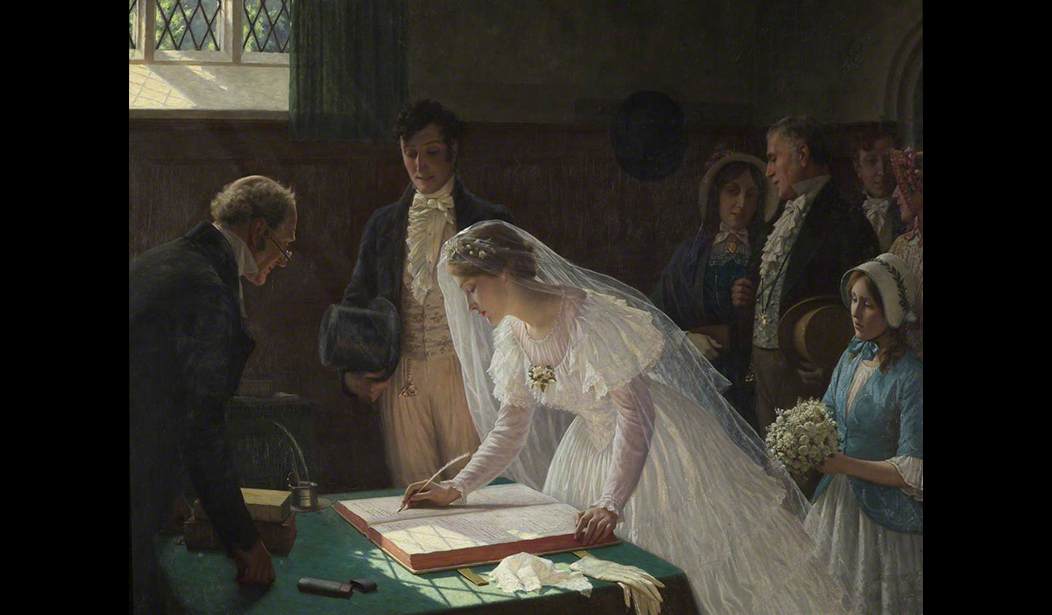Marriage does seem to be the natural order of things. As with anything, there are exceptions, but by and large, throughout human history, humans have gotten married (or at least, cohabitated, in those days before there were formal systems for such things) and had families. Marriage, many would say - me among them - is the bedrock of society.
I'm speaking, of course, as a man who has been happily married for 32 years - the son of parents who were happily married for 71 years - and married to a woman whose parents have been happily married for 59 years. So I'm hardly impartial.
So, it's not surprising to see a study by the University of Toronto’s Factor-Inwentash Faculty of Social Work (FIFSW) and the Institute of Life Course and Aging that indicates married men are happier and healthier as they age than unmarried men. But there's a catch - they only studied Canadians.
A new study that followed over 7,000 Canadians, middle-aged and older, for approximately three years found that married men or men who became married during the study period were twice as likely to age optimally compared to their never-married male peers.
Among women, those who had never married were twice as likely to age optimally compared to married respondents who became widowed or divorced during the study period. Married women did not differ significantly from never-married women with respect to optimal aging.
“Little is known about the relationship between marital trajectories in old age and successful aging. Our goal was to see whether different marital trajectories were associated with physical health and well-being, and whether these relationships varied for men and women,” says first author Mabel Ho, a recent doctoral graduate at the University of Toronto’s Factor-Inwentash Faculty of Social Work (FIFSW) and the Institute of Life Course and Aging.
They varied, all right; the benefits of a long-term marriage didn't seem to apply the same way to women. That's... well, there's probably a joke in there somewhere but I'll let that go for now. But I'm skeptical of that differentiation. As we age, both sexes, I feel certain, gain the benefits that come from a solid marriage: Partnership, friendship, intimacy, and trust, not to mention sharing the joys of children and grandchildren.
Here's an interesting tidbit from the study's report, and it would seem to indicate that it may not be marriage, per se, but rather just having good social contacts that make the difference.
“Being socially connected with others is important, especially in later life. Having regular contact with relatives, friends and neighbours can help older adults feel connected, reduce their sense of loneliness, and improve their overall well-being,” says Eleanor Pullenayegum, a Senior Scientist at The Hospital for Sick Children (SickKids) and professor at the University of Toronto.
That's not surprising. Not one bit. We are, after all, social creatures. Some of us need more social contact than others, of course. Take our family: Our oldest daughter has a huge circle of friends, and since she runs the only medical clinic in a small town, she has an even larger circle of patients and acquaintances. Her social life is, shall we say, busy and complex. My wife and I, on the other hand, prefer our rather isolated rural lifestyle, and entire weeks go by when we don't see or speak with another person beside each other.
That suits our daughter, and it suits us.
See Related: Kamala Harris' Husband Admits to Affair - Which Resulted in Pregnancy - With His Kids' Teacher/Nanny
The Press Go After JD Vance's Mamaw and Papaw in Absolutely Disgusting Political Hit
This seems to point to one obvious conclusion: People who are married tend to be happier and healthier. But I wonder about the cause/effect chain here. There have been studies done on the traditional education -> marriage -> children cycle, and how people who follow that path tend to be happier and more prosperous. But I've often wondered if the causal chain there is reversed; if the people who follow that traditional path do so because they are more responsible, more willing to defer gratification in pursuit of higher goals, and so forth. In this case, I wonder if people who take better care of themselves physically are more apt to have strong social skills to go along with their strong bodies, and therefore are more apt to have healthy, happy long-term relationships.
The answer to that is, of course, "I don't know."
Even so, this study contains no surprises - at least not for anyone who enjoys (or has enjoyed) a stable, happy marriage. The most obvious reason is that marriage, or at least monogamous cohabitation, is still, after many thousands of years, the natural order of things for the vast majority of humans - and we are happiest and healthiest when following that natural order.














